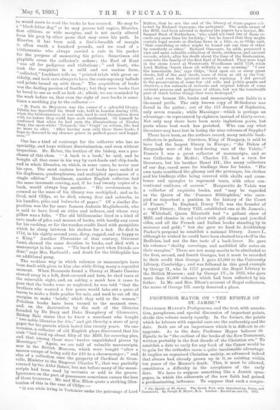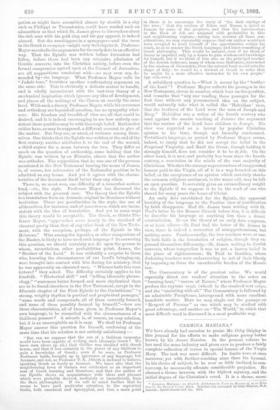PROFESSOR MAYOR ON "THE EPISTLE OF ST. JAMES."*
PROFESSOR MAYOR'S Prolegotnena, and the text, with annota- tion, paraphrase, and special discussion of important points, divide this volume nearly equally. In the former, the points which he labours with especial care are the authorship and the date. Both are of an importance which it is difficult to ex- aggerate. As to the date, Professor Mayor believes th Epistle to be "the earliest of the books of the New Testament, written probably in the first decade of the Christian era." To establish a date so early for any book of the Canon would be to gain for the orthodox cause a quite inestimable advantage. It implies an organised Christian society, so advanced indeed that abuses had already grown up in it, as existing within ten years of the Master's death. This, it must be allowed, constitutes a difficulty in the acceptance of the early date. We have to suppose something like a Jewish syna- gogue, in which the adherents of the new faith had gained a predominating influence. To suppose that such a congre- * Tho Epistio of St. James. The Greek Text, with Introduction, Notes, and Comments, By Joseph B. Mayor, M.A. London Macmillan and Co. 1992,
gation as might have assembled almost by stealth in a city such as Philippi or Thessalonica, could have needed such an admonition as that which St. James gives to his readers about the rich man with his gold ring and his gay apparel, is indeed absurd. But the worshippers in a synagogue—and the term in the Greek is avyayoyi—might very well require it. Professor Mayor marshalls the arguments for the early date in an effective way. That the Epistle was written before Jerusalem had fallen, before there had been any extensive admission of Gentile converts into the Christian society, before even the formal compromise agreed upon at the Council of Jerusalem, are all suppositions consistent with—we may even say, de- manded by—its language. What Professor Mayor calls its "Judaic tone," furnishes another confirmatory argument on the same side. This is obviously a delicate matter to handle, and is wholly inconsistent with the cast-iron theory of a mechanical inspiration which ignores any idea of development, and places all the writings of the Canon on exactly the same level, With such a theory, Professor Mayor, while his reverence and orthodoxy are beyond all question, has no sympathy what- ever. His freedom and breadth of view are all that could be desired, and it is indeed encouraging to see how entirely con- sistent these qualities may be with thorough belief. Rationalist critics have, as may be supposed, a different account to give of the matter. But they are, as usual, at variance among them- selves. One thinks that the Epistle was written at the end of the first century, another attributes it to the end of the second, a. third argues for a mean between the two. They differ as much on the question of authorship, some holding that the Epistle was written by an Ebionite, others that the author was orthodox. The supposition that he was one of the persons mentioned in the New Testament bearing the name of James, is, of course, too subversive of the Rationalist position to be admitted on any terms. And yet it agrees with the charac- teristics of the document itself better than any other.
There is, we must own, one difficulty of a somewhat serious kind,—viz., the style. Professor Mayor has discussed the subject with the greatest care. The theory that the Epistle is a translation from an Aramaic original he dismisses without hesitation. There are peculiarities in the style, the use of alliteratives, for instance, and of 6,:someise.ssa, which are incon- sistent with the idea of translation. And yet in some ways this theory would be acceptable. The Greek, so thinks Pro- fessor Mayor, "approaches more nearly to the standard of classical purity than that of any other book of the New Testa- ment, with the exception, perhaps, of the Epistle to the Hebrews." Who among the Apostles, or other companions of the Master, is likely to have used such language ? In answering this question, we should certainly not fix upon the person to whom, nevertheless, other probabilities point, James, the "Brother of the Lord." It was evidently a surprise to those who, knowing the circumstances of our Lord's bringing-up, were brought into contact with him during his ministry, that he was apparently an educated man. "Whence 'lath this man letters P " they asked. The difficulty certainly applies to his kinsfolk. "Rhetorical skill" and "telling idiomatic phrase- ology," sentences better formed and more rhythmical than are to be found elsewhere in the New Testament, except in the fifteenth chapter of the First Epistle to the Corinthians," "a strong, weighty rhythm in poetical and prophetical passages," "some words and compounds, all of them correctly formed, and some of them possibly formed by himself,"—how are these characteristics, all of them given in Professor Mayor's own language, to be reconciled with the circumstances of a Galilasan peasant P A miracle is, of course, an easy solution, but it is as unacceptable as it is easy. We shall let Professor Mayor answer this question for himself, confessing at the same time that his solution is not entirely satisfactory :—
"But can we suppose that the son of a Galilean carpenter would have been capable of writing such idiomatic Greek We have seen above (p. xli.) that Galilee was studded with Greek towns, and that it was certainly in the power of any Galilean to gain a knowledge of Greek ; even if he were, as Professor Neubauer holds, brought up in ignorance of any language but Aramaic, and not, as Professor T. K. Abbott is inclined to believe, speaking Greek as freely as Aramaic. We know also that the neighbouring town of Gadara was celebrated as an important seat of Greek learning and literature, and that the author of our Epistle shows an acquaintance with ideas and phrases which wore probably derived, mediately or immediately, from the Stoic philosophers. If we call to mind further that he seems to have paid particular attention to the sapiential books, both canonical and apocryphal, and that a main point in these is to encourage the study of the dark sayings of the wise ; ' that the wisdom of Edom and Teman is noted as famous by some of the prophets, and that the interlocutors in the Book of Job are assigned with probability to this and neighbouring regions,—taking into account all these con- siderations, we may reasonably suppose that our author would not have scrupled to avail himself of the opportunities within his reach, so as to master the Greek language, and learn something of Greek philosophy. This would be natural, even if we think of James as impelled only by a desire to gain wisdom and knowledge for himself, but if we think of him also as the principal teacher of the Jewish believers, many of whom were Hellenists, instructed in the wisdom of Alexandria, then the natural bent would take the shape of duty : he would be a student of Greek in order that he might be a more effective instructor to his own people." (pp. ecix.-ccx.)
A subsidiary question is,—What is meant by the "brother
of the Lord" ? Professor Mayor collects the passages in the New Testament, eleven in number, which bear on the question, and remarks that "any one- reading these passages for the first time without any preconceived idea on the subject, would naturally take what is called the ‘Helvidian ' view,
that the brethren of the Lord were the sons of Joseph and Mary." Helvidius was a writer of the fourth century who used against the ascetic teaching of Jerome the argument that the mother of the Lord bore children to Joseph. His view was regarded as a heresy by popular Christian opinion in his time, though not formally condemned. Tertullian's language, as quoted by Professor Mayor, seems, indeed, to imply that he did not accept the belief in the Perpetual Virginity, and Basil the Great, though holding it strongly himself, does not consider it to be de fide. On the other hand, it is now, and probably has been since the fourth century, a conviction in the minds of the vast majority of
Christians. Whether the strange superstructure of exaggerated honour paid to the Virgin, all of it in a way founded on this belief, or the acceptance of an opinion which certainly shocks the common religious sentiment, is the worse evil, may be left an open question. It certainly gives an extraordinary weight to the Epistle if we suppose it to be the work of one who shared for many years the home of Christ.
An early date established for the Epistle, the apparent hostility of the language to the Pauline view of justification by faith disappears. Had St. James been writing with St. Paul's letter to the Roman Church before him, it is difficult to describe his language as anything less than a direct
contradiction. If—as the theory of an early date supposes, or at least allows—St. Paul had the letter of St. James in view, there is indeed a correction of misapprehensions, but nothing more. Fundamentally, the two teachers were at one. To both faith is the foundation of religion, though they ex- pressed themselves differently,—St. James writing to Jewish converts, whose temptation it was to put a barren belief in the place of righteousness ; St. Paul to Gentiles, whom Judaising teachers were endeavouring to rob of their liberty by imposing on them the unendurable burden of the Mosaic law.
The Commentary is of the greatest value. We would especially direct our readers' attention to the notes on
"burning' heat," "course of Nature," where Professor Mayor prefers the oxytone eivo,e4 (wheel) to the received text eplesos,
and the "anointing with oil." The Commentary is followed by an admirable Paraphrase, interspersed with some excellent
homiletic matter. Here we may single out the passage on "Respect of Persons" as one which may be studied with great advantage, and another on "The World," ihi which that
most difficult word is discussed in a most profitable way.







































 Previous page
Previous page